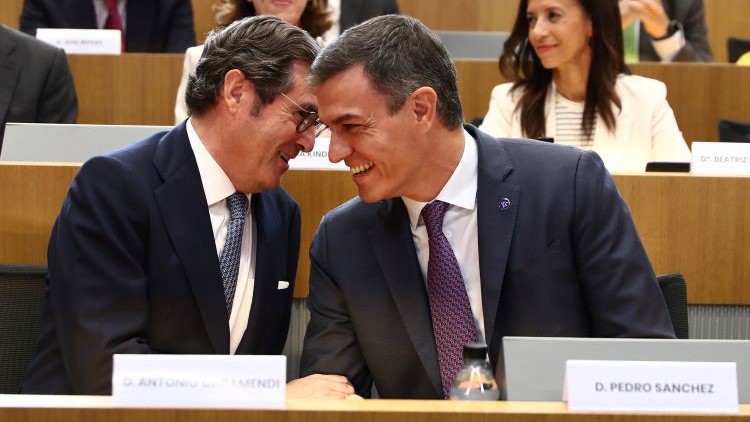The Diplomat
First Vice President and Acting Minister of Economic Affairs and Digital Transformation, Nadia Calviño, will have to wait to secure her appointment as President of the European Investment Bank (EIB) after the EU Economy and Finance Ministers (Ecofin) met this week in Santiago de Compostela (in Galicia, their homeland) they have chosen to postpone the vote pending a greater consensus.
Nadia Calviño is among the favorites to get the position, but the fight for the presidency of the EIB appears especially complicated. Her main rival is the vice president and European Commissioner for Competition, the Danish Margrethe Vestager, who recently requested a temporary leave of absence from the European Commission to focus on her candidacy, but there are three other candidates: the Polish and vice president of the EIB Teresa Czerwinska, the former minister Italian deputy governor of the Bank of Italy Daniele Franco and the Swede and also vice president of the EIB Thomas Östros. Whoever manages to win the election will succeed the German Werner Hoyer, whose term expires at the end of this year, and will take office on January 1, 2024.
Calviño’s purpose was for the vote to take place during the informal meeting of the Council of Ministers of Economy and Finance (Ecofin), which has been held since yesterday and will conclude today in the Galician capital. However, as the Belgian Minister of Finance and acting President of the EIB, Vincent Van Pethegem, told the press yesterday, the participants in the meeting have chosen “not to force the process” and to try to agree on “a consensus candidate”. a point where “I don’t think we’re at it yet.”
According to Pethegem, these are five “strong” candidates and, therefore, it is advisable to allow time to pass so that “informal consultations” can be carried out that should culminate in the appointment of the new president of the EIB. In any case, he specified, his goal is for the process to move forward “as quickly as possible” because “the sooner a candidate is found, the better.” For all these reasons, although the issue could be addressed in Santiago de Compostela, it is very unlikely, barring surprise, that a decision will be made in the Galician capital and everything indicates that it will be postponed to future meetings, such as the next formal meeting of the ministers. of EU Finance, which will take place in Luxembourg in mid-October.
Four candidates in Santiago
The competition is such that, in a rather unusual event, four of the five candidates have met in Santiago de Compostela. This is the case of Vestager, who, despite not being Minister of Finance and having temporarily resigned from the European Commission, is in Galicia as part of the Danish delegation; or Daniele Franco and Teresa Czerwinska, who do not belong to Ecofin. The only one who did not attend was Thomas Östros.
In statements to the press, Nadia Calviño valued the presence of four of the candidates at the meeting (her included) because it will allow them to talk about this issue with the European ministers. However, she warned that she would not be the one to address this matter in Galicia because “it does not seem appropriate to me, taking into account that I chair these meetings of the informal Ecofin and that we are in Spain and not only in Spain, but in my land, in Galicia, here in Santiago de Compostela.”
To obtain the presidency of the EIB, the support of 68% of the bank’s capital and at least 18 Member States is required. Given that the participation of each Member State depends on its economic weight in the EU in terms of GDP, to obtain the position it is essential to have the support of the three great economic powers of Europe and main shareholders of the bank, based in Luxembourg: Germany, France and Italy. Spain has 11% of the shareholders and these three countries have 19% each. The sum of the four countries would therefore ensure the necessary 68%, regardless of what the rest vote.
In this regard, the German minister, Christian Lindner, assured yesterday that his government “has not yet made a decision.” However, everything indicates that Spain would have obtained the support of Germany in exchange for sacrificing the appointment of Margarita Delgado, deputy governor of the Bank of Spain, as supervisor of the ECB in favor of the German Claudia Buch.
For his part, the French minister Bruno Le Maire limited himself to responding that he would make public the position of his country “later”, without further details. Spain’s opposition to nuclear power plants works against French support for Calviño and Le Maire himself has admitted that no candidate meets all the ideal conditions. Some sources have indicated that Spain could have obtained the support of Italy in exchange for supporting Daniele Franco for the vice presidency of the European Central Bank, where he would coincide with Luis de Guindos.
The European Investment Bank (EIB), founded in 1958 after the entry into force of the Treaty of Rome that established the European Economic Community (EEC), constitutes the main financial arm of the EU and is one of the largest development entities on a global scale. world. Whether Calviño or Vestager win (the two main candidates), she would be the first woman to head the entity since its founding 65 years ago. For Calviño, this candidacy is especially relevant after her failed attempts to direct the International Monetary Fund (IMF) after the departure of Christine Lagarde to the European Central Bank (ECB) and to preside over the Eurogroup, made up of the economic ministers of the euro zone.







